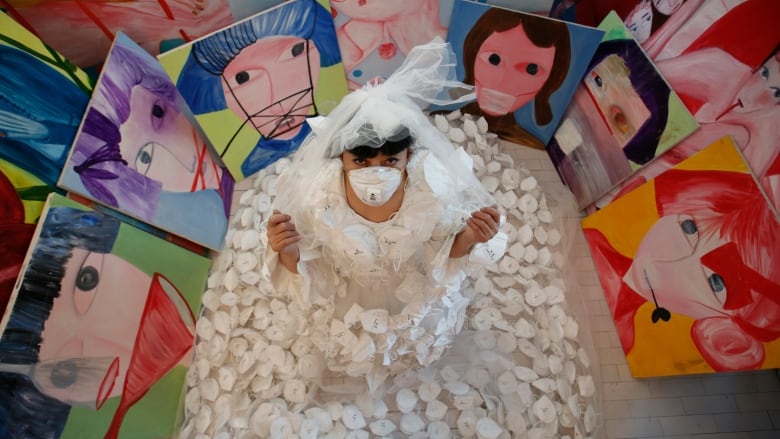Artists use innovation to take on Beijing smog
Red alert issued for 2nd time this month over air quality in Chinese city

While Beijing residents are wheezing through a second smog red alert this month, they could contemplate the works artists are creating to alert them to the air pollution dangers.
Chinese artists have created many such works and now a well-known Dutch artist and designer hopes to have a work installed soon in Beijing that will also have a practical impact.
Daan Roosegaarde wants to install his "smog-free tower" in Beijing's parks and playgrounds.
- Beijing issues 2nd smog red alert of the month
- Eerie photos spotlight polluted air in Beijing and New Delhi
His first tower operates near his studio in Rotterdam, Netherlands, and he is awaiting Beijing's approval to start installing towers there.
The seven-metre towers will use the same ionization process deployed in some European hospital air purifiers to remove pollutants from outdoor air.
"We just sort of scaled-up and made the largest one in the world," he told CBC News, adding the idea was inspired by Beijing's smog.
By blowing fresh air out its sides, creating a high-pressure zone, he says the tower will create a clean-air bubble so kids can play outside, for example.
What Roosegaarde really wants is to use his international recognition — he's been profiled in the New York Times, Slate and the U.K. newspaper The Guardian — to help build and inspire "the smog-free movement, to make sure the smog-free towers aren't necessary any more."

He says that if the smog problem in Beijing can be solved, then New Delhi, Mexico City and other places will be easy.
"Beijing can also turn it around as a sign of innovation rather than something they are ashamed of," he says.
Vacuuming up Beijing's air pollutants
On a smaller scale, Chinese performance artist Wang Renzheng started going around Beijing with an industrial vacuum cleaner in July, hoovering up city air.
Wang, who performs using the name Nut Brother, wrapped up his "Dust Project" in December by producing a brick from the pollutants his vacuum had sucked up.

The project went viral in China, coincidentally reaching its climax during the first red alert earlier this month.
"This is not an issue to be ignored, and I want to magnify it so much that you cannot ignore it," Wang says.

Last year, as part of a performance art work, 20 artists wearing dust masks played dead at Beijing's ancient Temple of Heaven. The former imperial sacrificial altar is now a top tourist attraction, making it it a risky act of protest.
Beijing-based artist Matt Hope, originally from the U.K., created a "breathing bicycle" to ride around the city and "make people think about the problem."

To create his work, he used a perforated garbage can, moped helmet, fighter-pilot breathing mask, wheel-powered generator and home air filtration system.
Hope described his work as "a ridiculous solution for a ridiculous problem."
Life imitates art (again)
As often happens, life is imitating art, this time with a Canadian connection. In recent days, media around the world have carried stories about Alberta-based Vitality Air, a start-up selling what it describes as bottles of Lake Louise or Banff air, starting at $21.50 each in China.
Vitality's sales started to take off in late November, peaking during the early December red alert, according to the company's China representative, Harrison Wang. With Beijing's air once again very unhealthy or worse, sales could more than double this week but the company is out of stock for the moment.

Last year, well-known Beijing artist Liang Kegang bottled some air in France and it sold in Beijing for $1,130.
Liang put his air in a flip-top, rubber-sealed preserves jar, added some labels and delivered it to a group auction of works by about 100 artists. "This is my way to question China's foul air and express my dissatisfaction," he said.
Li Yongzheng, the winning bidder, said afterwards, "I have always been appreciative of Kegang's conceptual art, and this piece was very timely."
The Associated Press described the work as "part of a gust of recent artistic protest — and entrepreneurial gimmickry — reflecting widespread dissatisfaction over air quality in China."
Dress for smog
A year ago, around Beijing, artist Kong Ning wore a 10-metre-long wedding gown she made using 999 white dust masks. During the first red alert, she wore newer creations, hoping to raise awareness of the health risks of smog.

With the especially thick air of recent weeks, some artists have taken to taking photos of Beijing landmarks heavily shrouded in the unhealthy haze, adding an outline of the landmark to the photo and then posting it on social media.
Other photographers post images on social media showing scenes on a clear day, matched with a heavily polluted day.
Maps for air quality apps, now popular in Beijing, that provide current pollution data, could provide artists with new source material for taking on the smog.
'Airpocalypse' grips Beijing
With files from the Associated Press and Reuters